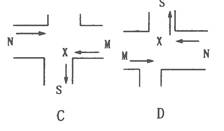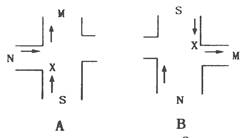
It was a party. I was 18 and it was fresher(´óÒ»ÐÂÉú) week. I was at the beginning of a course in English Literature and full of enthusiasm for my subject. She was also 18 and enrolled in a course in physics.
¡°Your major is of no use to society. What will you do with it when you graduate, other than teach? Plus, you¡¯re going to be poor your whole life,¡± she said. ¡°You have no soul and your degree is boring. I don¡¯t care how much money you¡¯re going to earn. I¡¯d rather be poor and don¡¯t mind being a teacher. If I love my work I¡¯ll have something far more meaningful than a big bank account!¡± came the reply.
And so it went, back and forth, neither of us giving the other an inch, each of us stubbornly committed to our prejudice. We were both ignorant, but our ignorance was also society¡¯s ignorance. It had always been that way. Scientists mocked(³°Ð¦) humanists; humanists laughed at scientists. Back in the 1960s, the physicist-turned novelist C. P. Snow labeled the sciences-humanities divide ¡°a problem of ¡®the two cultures¡¯¡± . He said it was bad for society. The modern world needed well-rounded people.
I think I know better now, but it would have helped if we had been encouraged to think a little more outside our science and arts ¡°boxes¡±.
That¡¯s why I believe it is healthy that China is beginning a debate on whether it¡¯s wise for young people to have to choose which direction their careers ¨C and lives ¨C will take at such an early age. At the moment, in their second year of high school, students must choose either the sciences or the humanities. After making the choice, they focus their energies on passing the appropriate college entrance exam.
But now, people in China are asking: Is this forced, early decision good for young people or society? Young people need time to explore, to discover where their real talents and interests lie. There are more than just a few middle-aged people out there, stuck in jobs they hate because they made the wrong choice at the wrong time.
And from the point of view of society, isn¡¯t it better for students to delay a while before they decide what to study? Scientists can benefit from learning to develop the critical skills associated with the humanities; students in the humanities, surely, only stand to gain by finding out a little more about science and technology, which are so important to the future of a developing country like China.
With any luck, in the future young people fresh to college will be better informed about the possibilities of education than people of my generation.
1.The author describes what happened at a fresher party to ________.
A. show that he was ready to defend the subject he enjoyed
B. lead up his argument that the sciences-humanities divide is harmful
C. prove that doing something meaningful is better than having a lot of money
D. describe how fierce students of different majors can be when arguing with each other
2.What was C. P. Snow¡¯s attitude towards the sciences-humanities divide?
A. Indifferent. B. Uncertain. C. Positive. D. Negative.
3.In the sixth paragraph, an example mentioning middle-aged people is used to show that ________.
A. students should not make decisions too early
B. not all people have a talent for or are interested in the sciences
C. these people did not have the chance to make a choice earlier in life
D. the earlier young people make a decision, the better it will be for them
4.According to the text, it is safe to say that ________.
A. sciences are more practical in the modern world
B. C. P. Snow was a novelist who became a physicist
C. future generations will be able to get more out of education
D. a command of both the sciences and humanities is important to society
5.What¡¯s the best title for the article?
A. The sciences or the humanities, which to choose?
B. High school education in China
C. Isn¡¯t it better to delay the choice of the career direction?
D. A better time to decide what to study

| Ä꼶 | ¸ßÖÐ¿Î³Ì | Ä꼶 | ³õÖÐ¿Î³Ì |
| ¸ßÒ» | ¸ßÒ»Ãâ·Ñ¿Î³ÌÍƼö£¡ | ³õÒ» | ³õÒ»Ãâ·Ñ¿Î³ÌÍƼö£¡ |
| ¸ß¶þ | ¸ß¶þÃâ·Ñ¿Î³ÌÍƼö£¡ | ³õ¶þ | ³õ¶þÃâ·Ñ¿Î³ÌÍƼö£¡ |
| ¸ßÈý | ¸ßÈýÃâ·Ñ¿Î³ÌÍƼö£¡ | ³õÈý | ³õÈýÃâ·Ñ¿Î³ÌÍƼö£¡ |
¿ÆÄ¿£º¸ßÖÐÓ¢Óï À´Ô´£ºÈýµãÒ»²â´ÔÊé¡¡¸ßÖÐÓ¢Óï¡¡±ØÐÞ2(±±½ÌÓý°æ¿Î±ê±¾) ±±½ÌÓý°æ¿Î±ê±¾ ÌâÐÍ£º050
| |||||||||||||||||||||||||||||||||||||||||||||||||||||||||||
²é¿´´ð°¸ºÍ½âÎö>>
¿ÆÄ¿£º¸ßÖÐÓ¢Óï À´Ô´£º ÌâÐÍ£ºÔĶÁÀí½â
ÍêÐÎÌî¿Õ£¨¹²20СÌ⣬ÿСÌâ1.5·Ö,Âú·Ö30·Ö£©
ÔĶÁÏÂÃæ¶ÌÎÄ£¬ÕÆÎÕÆä´óÒ⣬Ȼºó´Ó36¡ª55Ìâ¸÷ÌâËù¸øµÄËĸöÑ¡ÏA¡¢B¡¢CºÍD£©ÖУ¬Ñ¡³ö¿ÉÒÔÌîÈë¿Õ°×´¦µÄ×î¼ÑÑ¡Ïî¡£
He was 11 years old and went fishing every chance he got from the dock at his family¡¯s cabin on an island in the middle of a New Hampshire lake. On the day __36__ the bass (öÔÓã) season opened, he and his father were fishing early in the evening, __37__ sunfish with worms. Then he tied on a small lure (Óã¶ü) and practiced casting. When his pole __38__, he knew something huge was __39__. His father watched __40__ as the boy skilfully worked the fish alongside the dock. Finally, he very carefully lifted the __41__ fish from the water. It was the largest one he had ever seen, __42__ it was a bass. It was 10 P.M.-- two hours before the season opened. The father looked at the fish, then at the boy.
¡°You¡¯ll have to __43__, son,¡± he said.
¡°Dad!¡± cried the boy.
¡°There will be other fish,¡± said his father.
¡°Not as big as this one,¡± cried the boy.
__44__ no one had seen them, nor could anyone ever know what time he caught the fish, the boy could __45__ by his father¡¯s firm voice that the decision was __46__. He slowly worked the hook out of the lip of the huge bass and lowered it into __47__. The creature moved its powerful body and __48__. The boy thought that he would never again see such a great fish.
That was 34 years ago. Today, the boy is a successful architect in New York City. And he was __49__. He has never again caught such a magnificent fish as the one he __50__ that night long ago. But he does see __51__ fish again and again every time he comes up against a question of principles. As his father taught him, principles are simple matters of right and wrong. It is only the practice of principles__52__ difficult. Do we __53__ when no one is looking?
We would if we __54__ to put the fish back when we were young. For we would have learned the truth. The decision to do right lives __55__ in our memory. It is a story we will proudly tell our friends and grandchildren.
36£®A£®until B£®when C£®after D£®before
37£®A£®providing B£®catching C£®feeding D£®supplying
38£®A£®bent over B£®came up C£®turned over D£®broke down
39£®A£®on the other end B£®on the other hand C£®on one hand D£®at the either side
40£®A£®with anxiety B£®in surprise C£®with admiration D£®for fear
41£®A£®delighted B£®frustrated C£®frightened D£®exhausted
42£®A£®and B£®but C£®however D£®yet
43£®A£®bring it home B£®put it aside C£®put it back D£®pick it up
44£®A£®Even though B£®Now that C£®Ever since D£®In case
45£®A£®tell B£®say C£®speak D£®talk
46£®A£®passed B£®changed C£®fixed D£®refused
47£®A£®the wide container B£®the broad sea
C£®the black water D£®the small river
48£®A£®fled B£®disappeared C£®floated D£®swam
49£®A£®wrong B£®right C£®satisfactory D£®pleased
50£®A£®landed B£®saw C£®cast D£®threw
51£®A£®a different B£®many big C£®even bigger D£®the same
52£®A£®which is B£®it is C£®that is D£®this is
53£®A£®do wrong B£®do right C£®do harm D£®do good
54£®A£®were taught B£®told C£®were let D£®ordered
55£®A£®freshly B£®fresh C£®clearly D£®strongly
²é¿´´ð°¸ºÍ½âÎö>>
¿ÆÄ¿£º¸ßÖÐÓ¢Óï À´Ô´£º±±¾©Êг¯ÑôÇø2009¡ª2010ѧÄê¶È¸ßÈýÄ꼶µÚ¶þѧÆÚͳһ¿¼ÊÔ ÌâÐÍ£ºÔĶÁÀí½â
|
 |
²é¿´´ð°¸ºÍ½âÎö>>
¿ÆÄ¿£º¸ßÖÐÓ¢Óï À´Ô´£ºËÄ´¨Ê¡Äϳä¸ßÖÐ2010½ì¸ßÈýÏÂѧÆÚ4ÔÂÔ¿¼ ÌâÐÍ£ºÔĶÁÀí½â
C
(1)Mr. Brown(the motorist)
At about 9¡Ã20 p.m. on October 14th, I was driving along Market Road in the direction of Midwick. I wanted to go to Sturham to collect my wife, who had been visiting some friends. I prepared to turn into Sturham Road, which was on my right. In the distance, I saw the lights of a car moving towards me but it was a long way from me. I put out my hand to show that I was going to turn right. Then I started to turn slowly towards Sturham Road. Suddenly there was a loud noise on the passenger¡¯s (near) side of the car. I stopped the car and got out. A motorcycle had hit my car. The motorcyclist had been thrown over the car. He was injured, so I ran to a shop to phone for help.
(2)Mr. Smith (the injured motorcyclist)
On the evening of October 14th, I was going home along Market Road towards Newtown. I was riding my motorcycle. I was going slowly because some of the streetlights were out and the road was wet and slippery. Just before Sturham Road, a car suddenly drove right across my path. The driver did not flash his lights to give a warning. I could not turn in time, so I hit the side of the car. When I woke up, I was lying in a hospital in Market Road.
(3)Mr. Lee (another motorcyclist)
At about 9¡Ã10p.m.on October 14th, I left my home in Midwick. Ten minutes later I was riding my motorcycle along Market Road. I was going to Newtown. There was a motorcycle about 40 metres in front of me. It was not going very quickly. The man on it was riding near the curb(·±ß) but I was near the center of the road. The motorcyclist in front of me tried to turn to his right but there was no time. He hit the car and was injured. There was no car going along in front of us or put by the road.
50£®Which or these pictures exactly shows the scene of the accident?
X£½the place where the motorcycle hit the car; N£½Newtown; M£½Midwick; S£½Sturham. (Note that cars and motorcycles always keep to the left in England.)

51£®Which of these statements about the accident is probably correct?
A£®Mr. Brown wrongly supposed that the lights of the two motorcycles were those of a car.
B£®The lights of the car moving towards Mr. Brown made him unable to see.
C£®Mr. Brown knocked down a motorcyclist on purpose.
D£®The accident was caused by the carelessness of the first motorcyclist.
52£®It seems probable from the statements that Mr. Brown_______.
A£®gave no signal to show that he was turning right
B£®did not give any signal until he was actually turning
C£®failed to give a proper signal at that time
D£®flashed his light to show that he was going to turn
53£®We would expect to find that Mr. Brown¡¯s car was damaged on its______ side.
A£®front¡¡¡¡¡¡¡¡¡¡B£®left¡¡¡¡¡¡¡¡¡¡C£®right¡¡¡¡¡¡¡¡¡¡D£®driver¡¯s
²é¿´´ð°¸ºÍ½âÎö>>
¿ÆÄ¿£º¸ßÖÐÓ¢Óï À´Ô´£º2011-2012ѧÄêÕã½Ê¡º¼ÖÝÊÐÎ÷ºþ¸ß¼¶ÖÐѧ¸ßÒ»5ÔÂÔ¿¼Ó¢ÓïÊÔ¾í£¨´ø½âÎö£© ÌâÐÍ£ºÌî¿ÕÌâ
µ¥´Êƴд
¡¾Ð¡Ìâ1¡¿It is good m____ __ to give your seat to an older person on the bus.
¡¾Ð¡Ìâ2¡¿The most ancient festivals would c the end of the cold weather, planting in spring and harvest in autumn.
¡¾Ð¡Ìâ3¡¿In European countries it is the custom to d churches and town halls with flowers and fruit, and people get together to have meals.
¡¾Ð¡Ìâ4¡¿C __________ drove Wang Peng inside Yong hui¡¯s restaurant.
¡¾Ð¡Ìâ5¡¿Even though her c might get thin after eating Yong Hui¡¯s food, they were not eating enough energy-giving food to keep them fit.
¡¾Ð¡Ìâ6¡¿So the only s is to combine the two menus together to get a balanced menu.
¡¾Ð¡Ìâ7¡¿I had thought it was a terrible film. On the c , it was exciting and moving.
¡¾Ð¡Ìâ8¡¿The next morning I¡¯ d just about given myself up for lost when I was s by a ship.
¡¾Ð¡Ìâ9¡¿Henry was given an e with money in it and asked not to open it until two p. m.
¡¾Ð¡Ìâ10¡¿The performance is good and is a f___ __ for my eyes.
²é¿´´ð°¸ºÍ½âÎö>>
¹ú¼ÊѧУÓÅÑ¡ - Á·Ï°²áÁбí - ÊÔÌâÁбí
ºþ±±Ê¡»¥ÁªÍøÎ¥·¨ºÍ²»Á¼ÐÅÏ¢¾Ù±¨Æ½Ì¨ | ÍøÉÏÓк¦ÐÅÏ¢¾Ù±¨×¨Çø | µçÐÅթƾٱ¨×¨Çø | ÉæÀúÊ·ÐéÎÞÖ÷ÒåÓк¦ÐÅÏ¢¾Ù±¨×¨Çø | ÉæÆóÇÖȨ¾Ù±¨×¨Çø
Î¥·¨ºÍ²»Á¼ÐÅÏ¢¾Ù±¨µç»°£º027-86699610 ¾Ù±¨ÓÊÏ䣺58377363@163.com